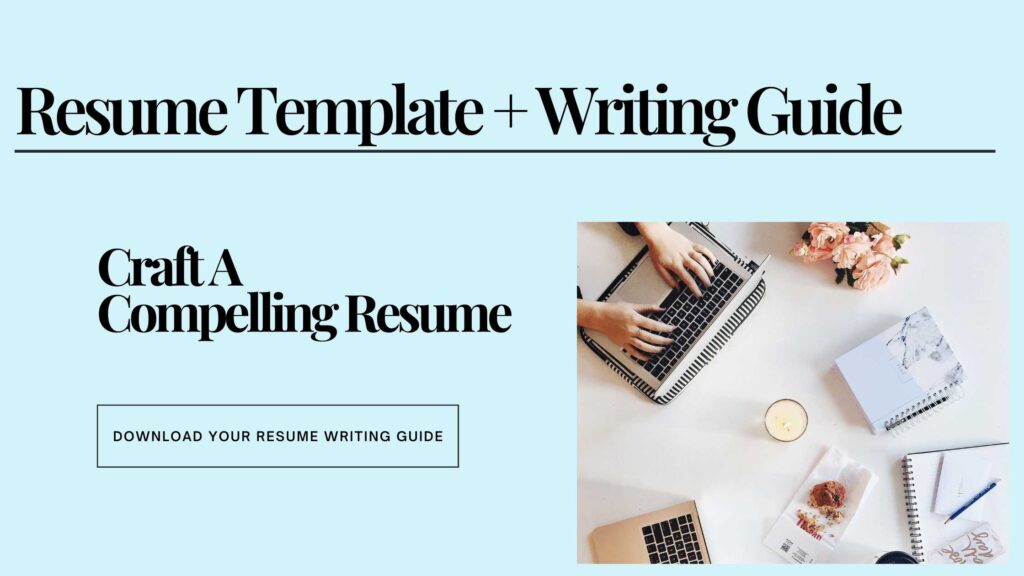
Job Searching 101 – A Crash Course to Help You Start Your Job Search
Welcome to Job Searching 101! I am so glad you are here. In this crash course on job searching, we are going to go through preparing your job search marketing materials, designing your job search strategy, how to identify what jobs you should be applying for, and evaluating your job search strategy. By the end of this post, you should have a clear understanding of how to start your job search and find a job you love!
Now grab a coffee and a notebook, and let’s dive on in!
Disclosure: This post may contain affiliate links, meaning ReRouting Inc. gets a commission if you decide to make a purchase through links posted on this site, at no cost to you. Please read this disclosure for more info.
Prepare Your Job Search Marketing Materials
Before getting started with the actual search, you’ll want to have your marketing materials updated and ready to go. When I say marketing materials, I mean building out your professional brand.
Here is a list of some marketing materials that you may need when job searching:
- Resumes
- Cover letters
- Portfolios
- Elevator speeches
So before you start your actual search, start working on building your resume template(s) that you can quickly tailor to each job, your cover letter, a portfolio, and even your elevator speech used to introduce yourself to potential employers or in networking environments.
Design Your Job Search Strategy
I always tell clients not to put all their eggs in one basket. There are so many avenues to find a job that you really should not just focus on one resource to help you find a job. Creating a killer LinkedIn profile shouldn’t be the only strategy you have… let’s look at some different ways that you can look for jobs or build a referral network to have job opportunities delivered to you. Although I emphasize not putting all of your eggs in one basket when it comes to finding a job, you also need to ensure you down get overwhelmed and have too many balls up in the air in your job search. This will leave you feeling stressed out. I have seen it with my clients they have so much on the go, trying to juggle different strategies, but it is not productive to their job search.
Suggested read to help you with your job hunt: How To Automate Your Job Search
Create a LinkedIn profile
Even if you don’t plan to use LinkedIn for networking or your job search, create, update, or clean up your LinkedIn profile. Ensure that it includes your most recent experience and credentials. Add a headshot and use an eye-catching banner. Take a read through this blog post to learn more about optimizing and enhancing your LinkedIn profile to make it a job-lead generating machine!
You can download FREE LinkedIn (formatted) banners in my shop!
If you are job searching and it is not something that you are hiding from your current employer, turn on the #openforwork functionality.
By creating a profile and showing that you are looking for work, recruiters will be more likely to seek you out for opportunities they are looking to recruit for.
Pick job boards to start searching for jobs
Select a few boards that you are going to frequent to look for jobs. You don’t want to stick to only one, but you also also don’t want to use too many job boards as you’ll get overwhelmed with all of the opportunities. Where available, signup for job alerts so you don’t have to do as much of the searching yourself. Pro-tip, by using a job board aggregator, you’ll get access to multiple job boards in one. So, try setting up a one-stop-shop – to have jobs from various boards sent directly to you. Not to self promote, well, maybe a little bit, but ReRouting’s job alerts pull from multiple boards. You can sign up for email alerts here (job postings restricted to opportunities in North America).
There are so many global job search websites out there. Big brands like Indeed, LinkedIn, Career Builder, and ZipRecruiter – they are great hubs to search for jobs and you’ll usually find a significant number of jobs that match your career interests.
There are also several small, niche job boards, that are looking to attract candidates with very specific skills. For example, if I were to be searching for a new job in HR, a great place for me to start is the job board associated with my HR Professional Association. So, it may also be beneficial for you to see if there are any job boards for your specific industry or profession in addition to general job boards.
Contact head-hunters, recruitment firms, or placement agencies
I am going to tell you the same thing I tell my clients in my job search coaching practice…
I always suggest that my clients reach out to head-hunters – recruiters specific to their profession or industry. So, for example, if you are a Web Developer, speaking with a headhunter that specializes in placing Web Developers at firms will accelerate your job search. They will not only help you find a role, but they will also provide you with genuine feedback – as to why you may be struggling to find a job (if you are struggling).
The same goes for recruitment firms. On an ongoing basis, they are looking for top candidates to place at the firms they recruit for. Recruitment firms can be used for specific technical jobs and professions, but a lot of companies also use recruitment firms for general administrative positions.
If you are struggling in your job search and just need to make a paycheck until you find something permanent, I suggest contacting a placement agency. A placement agency is different from headhunters and recruitment firms. They are different because you are on their payroll being paid by the firm and they place you based on your knowledge, skills, and abilities at their client’s organizations. So, for example, if “Placement Agency XYZ” hires you, they will be the ones paying you. But, you won’t be performing work duties for them. They will send you off to a client’s site and you will perform the job that their client needs filled. Although this is a great option for getting a paycheck, you can bounce around to work at different client sites, and the hours of work may not be stable. Agency work isn’t for everyone, but it is amazing for others – especially for gaining experience in entry-level roles. There is also the opportunity for employers to hire you on to their payroll. If you can prove yourself as a good worker, a company will often speak with the agency and look at offering you a permanent position with them (on their own payroll).
Key takeaway from Job Searching 101, you don’t have to go at it alone!
Create a job search schedule for yourself and establish goals
Okay, you might be thinking…
What? I don’t need a schedule! Well, let me tell ya, yes you do.
If you are an active job seeker, you need to create a schedule and establish goals so you can find a job (if you are unemployed) or a new job (if you are itching to leave the one that you are in).
Wondering how many jobs an active job seeker should apply for? This post might help!
None of my client’s schedules and goals look the same, but here is an outline of things to consider.
Create a realistic schedule
If you are unemployed, your job search schedule will look different than if you are employed. If you are employed part-time, your schedule will likely look different than someone who works full-time. Schedule certain days and times (if not every day) that you are going to sit down and apply for jobs.
Decide if you are going to search for jobs and apply for them as you find them. Or, gather a few jobs that are fairly similar (therefore requiring fewer resume tweaks) that you can create an easy to use resume that you can quickly tweak for each application and batch it together. In other words, you collect a bunch of jobs first, once you have your “top picks”…then you sit down and apply to them.
Or, if you are simply relying on job alerts to notify you of open positions, create a schedule to receive them daily, weekly, monthly, etc. and decide when you are going to go through the job postings to find ones that you want to apply for, and then be sure to follow through.
Everyone is different in how they work best. I know for myself, the method that would work best for me is applying for jobs as I find them and tweaking each resume specifically for that job. I would feel less overwhelmed and more organized. I would be able to ensure I am creating the best resume ever, for the intended job!
You can grab a copy of my professional resume templates and writing guide to ensure you are creating a resume targeted to each job you apply for.
By creating a plan and implementing a schedule you will be more successful in reaching your job search goals.
Establish goals
When you have completed Job Searching 101, I want you to establish three goals.
- A job that you aspire to land (assuming you already have the qualifications)
- How many job applications you will apply for daily/weekly/monthly
- A date or timeframe that you’d like to land the job by
You are probably wondering why these goals….?
You might even be saying “a deadline…?” That’s not within my control.
But here’s the thing, without a clear vision of the job that you want, you might come across as wishy-washy in your application and job interviews – you can learn from my experience in this blog post. Without a clear focus, you might even stray and look at other job postings resulting in an unproductive job search. So, determine what job you want.
Secondly, identify how many jobs you will realistically apply for daily, weekly, monthly, etc. By setting an amount of jobs that you are going to apply for will help you keep going when you think you have done enough one day, it may be a reminder for you that maybe you haven’t. Or maybe it will make you realize that you are applying to too many jobs (we all need a break). Here is a blog post where I talk about how many jobs an active job seeker should apply for when on the hunt!
Finally, give yourself a date that you’d like to achieve that by. If you are unemployed it is likely ASAP, or you can be a little bit more kind to yourself and say by the end of <insert month>.
If you are employed and there is no rush, then I still suggest you set a goal. You have decided to search for a new job for a reason, write down those reasons as motivators and establish a deadline. Create a vision board with your career goals hang it somewhere you’ll see it every day as a reminder. Stay motivated it is easy to get sidetracked when you job search.
When you don’t establish plans, schedules, goals, and deadlines you are less likely to be productive and motivated with your search. So, if you do want to find a job or a new job map it all out.
To summarize how you are going to create your job search strategy, you are going to:
- Set up your LinkedIn profile
- Pick your job boards
- Connect with headhunters, recruitment firms, agencies to let them know you are looking for work
- Create a job search schedule and goals
Now, let’s move on to to the next module in job searching 101 to learn about job postings and identifying which ones are a good match for you!
Which Job Postings Should I Be Applying For?
You may know the field or industry that you want to work in but determining if the position is right for you can sometimes be a bit tricky. Here are some tips and information to consider when trying to determine what job postings may be right for you. We’ll first look at entry-level and then professional level roles. You can however apply the same theory to the level of job you are applying for.
Use Keyword Searches to Identify Entry-Level Opportunities
When you’re searching for jobs online, use the keyword search function if they do not have available filters (to segment out entry-level positions). Use keywords like “Entry-level”, “Internship”, “Student Job”, “Jr”, etc. Also, if you are graduating and have a few summer jobs and co-op placements on your resume, you can branch out to some keywords like “Coordinator” or “Clerk”.
I have spoken with new grads who are confused by the position title “Assistant”, thinking that it was and should be an entry-level role that they should apply for. In some cases, yes, you can find entry-level assistant positions. These assistant roles are often to assist a department within an organization. However, several Executive Assistant, Legal Assistant, etc. positions can require years of experience acting as an assistant for that profession, industry, or executive-level role. So, ensure that any Assistant positions you apply for are entry-level assistant positions.
Apply the Same Theory if You Are a Professional Searching for a Job
If you are a seasoned professional you can use the same theory and use keywords to search for the level of job you are seeking. For example Marketing Specialist, Payroll Manager, or Certified Electrician.
Use the Qualifications Section of the Job Advertisement to Understand How Many Years of Experience Are Required and What Specialized Skills Are Required
Always look under the qualifications portion of the job posting. Job postings usually use the following ranges when requesting “years of experience”: 1-3 years of experience, 3-5 years experience, 5+ years of experience, 8+ years of experience… some go as high as 10+ years.
You’ll also notice they may ask for experience within that position OR industry experience.
How Many of the Qualifications Should You Have?
A question I am often asked in my job search coaching services is…
How many of the qualifications should I have to be considered “qualified” for a role?
Unfortunately, there is no specific formula. By evaluating your job search strategy, you should be able to identify if you are applying for jobs you are not qualified for. But hopefully these Job Searching 101 tips will help you ensure you are applying for the right jobs.
You should focus on the specialized skills the job is asking for and you should be able to check off most of them. What you should do is go back to the job responsibilities portion of the posting and review it. If you can confidently say that you can perform those responsibilities with some training (specific to that organization’s programs and processes) and have related experience that you could talk about in an interview, then you should apply. You should be able to answer behavioral-based interview questions to demonstrate your abilities and quantify your experience – relevant to the position. If you can’t then you likely don’t have the qualifications.
Take a look at this post where I go through mastering interview methods being used by hiring managers and recruiters.
Find the Education and Certification Requirements Determined in the Job Description and Understand That These are Usually Non-Negotiable
I’ll give you a little bit of an HR inside scoop here. If an employer has indicated a certification, diploma, or degree (completion) requirement, it is likely non-negotiable. The only time you should consider applying for a job that has an education component that you do not have is if it specifically says, “an asset”. Chances are the job description has listed that as a requirement because the job’s compensation is based on that education/ certification component (and the compensation is measured against equivalent roles in an organization to establish a pay range)–so it’s usually non-negotiable.
The only time I will coach job seekers to apply for jobs that don’t have the required education is when they have the required certificates and years of work experience that overrides the educational component. There is still a large cohort of workers in the workforce without diplomas/ degrees that have years of work experience. The experience would be considered in place of the education requirement.
Consider if the Job’s Physical Location Makes Sense for You
Select a geographic perimeter that makes sense and don’t be tempted to expand beyond it. Yes. A lot of people work from home these days, but unless the job specifically states “remote” or “work from home” assume that you will be expected to travel into the office.
Get a clear understanding of how often you need to be at the work location. It must be convenient for you to get to and from work without any issues. You should be able to walk to work, easily access transit, or commute within a reasonable amount of time.
This may seem obvious, but over the years I have seen people quit jobs or lose jobs because of issues related to being too far of a commute. Either because they are spending too much time and money to get themselves to and from work, or they end up getting fired for always being late because of the distance they had to travel (traffic, weather, public transit issues, etc.). It also may be a red flag for employers if they believe your commute will be too long – they may omit you from the recruitment process at the resume submission phase.
Track Your Job Search Strategy
If you aren’t already tracking your job search, you better start!
By tracking your job search you’ll not only be able to see if you are sticking with your job search schedule and reaching your job application goal (GOAL #2), you’ll also be able to determine where you might be going wrong with your search.
If you are applying to a lot of job advertisements, but aren’t getting any responses from your resume….
It’s likely your resume that needs a little tweaking. Or, maybe you are applying for jobs you’re not qualified for.
If you are getting interviews but can’t get past an interview screen, or other stages within the interview process, then it may be your experience or interview skills.
By tracking your job search, it will make it easier for you to tweak and adapt your job search efforts and get help where you need it.
You can download my FREE job search tracking spreadsheet here!
Job Searching 101 Crash Course Wrap up
Well, this brings us to the end of Job Searching 101. In this post, we have gone through prepare your job search marketing materials, designing your job search strategy, how to identify what jobs you should be applying for, and evaluating your job search strategy. You should have a clear understanding of how to start your job search and find a job you love.
I would love to hear about your job search and celebrate any wins with you! Use the hashtag #reroutingyourcareer on Instagram and tag me in your post @reroutingyourcareer! Even better, let me know if you found this Job Searching 101 crash course helpful!
Best of luck in your job search!







